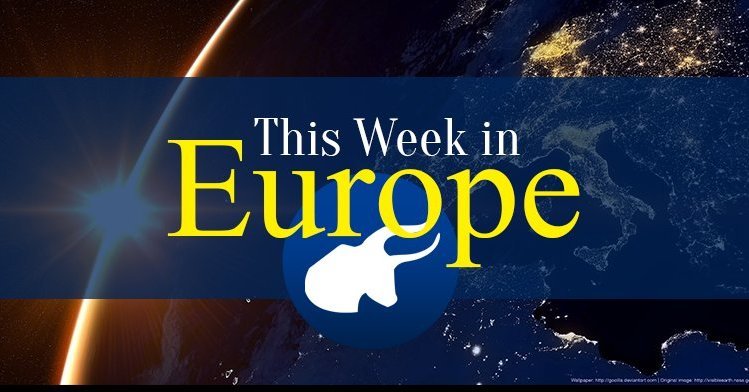Hungary passes “slavery law” amid protests
On Wednesday, the Hungarian parliament passed a controversial judicial reform and labor legislation dubbed the “slavery law” by its critics. Opposition MPs blew whistles and sounded sirens, but PM Viktor Orban’s conservative Fidesz party, with its two-thirds majority, easily passed the bill through parliament. The new labor code rose the maximum annual overtime hours that employers can demand from their employees from 250 to 400 hours, while also tripling the time period for calculating overtime payments. The government defends its push as a move toward deregulation and the encouragement of work and employment, while trade unions and opposition parties equate the new regulation to slavery. Protestors gathered outside the parliament, with some of them taking a knee to signal that they “have become slaves.”
Study: Europeans want fewer immigrants
On Monday, the Pew Research Center published a new study which shows that more than half of Europeans want fewer immigrants to move to their country. Precisely 51% of people from 10 EU countries included in the survey - Greece, Hungary, Italy, Germany, Sweden, Poland, France, the Netherlands, U.K. and Spain - preferred fewer or no immigrants moving to their country, compared to the 45% worldwide average. Other 35% of respondents wanted about the same number of immigrants to come to their country, while only 10% wanted more. Differences between countries lingered: in Greece, 82% of people wanted fewer or no migrants. 72% of Hungarians, 71% of Italians and 58% of Germans said the same, while only 37% of the Brits and 30% of the Spanish thought the same. The Pew study was published on the same day as 150 countries ratified the U.N. migration pact that had divided Europe.
Theresa May survives confidence vote
On Wednesday, U.K. PM Theresa May defeated an attempt from within her party to oust her and give the reigns of the Brexit process to someone else. In critical negotiations with the EU, May’s weakened position nevertheless resisted, with 200 votes to 117. With weeks remaining to secure a deal to leave the EU by March 29th, 2019, May is trying to shore up additional assurances from the EU to settle internal debates. In order to secure support for the confidence vote, May allegedly told MPs that she would not take part in the 2022 general election. Euroskeptic leaders decries the result of the vote and asked for the resignation of the PM. Jeremy Corbyn, the leader of the opposition Labour party, said the vote made no difference to the fundamentals of May’s position.
Belgium switches to minority government
This week, Belgian PM Charles Michel protected the collapse of his government after the Flemish nationalists decided to leave the ruling coalition due to their objection to the U.N. Global Compact on Migration. King Philippe of Belgium allowed Michel to reorganize his government into a minority one, replacing ministers that were part of the Flemish nationalist party, N-VA, such as the Secretary of State and the Interior Minister. Left without the support of a majority in the parliament, the government of Charles Michel is, however, in peril. Aware of the risk, Michel vowed to provide continuity until the regional, federal and European elections in May.
Terrorist opens fire in Strasbourg Christmas market
On Tuesday, a gunman opened fire at a Christmas market in Strasbourg, killing five people, among them two members of Europhonica, a multilingual European radio, and wounding eleven others. Identified as Cherif Chekatt, 29, the man yelled “Allahu Akbar” (God is great in Arabic) during the attack. On Wednesday morning, police in the Neudorf area of Strasbourg found and killed Chekatt in an exchange of gunshots. Known to French authorities and radicalized in prison, the man was armed with a gun and had escaped from the scene on Tuesday evening with a taxi.
PiS government also survive no confidence vote
This week, Poland’s nationalist Law and Justice (PiS) governing party won a confidence vote in the lower house of the parliament. Ahead of a general election next year, the conservative party has been coming under fire due to a corruption scandal involving banking regulator KNF, but still managed to defeat the motion with 231 MPs in favor and 181 against the government. With debates dominated by PM Mateusz Morawiecki, the PiS treated the no confidence vote as a show of strength, and called it a fruitless attempt from the opposition.
Italy promises to change budget plan
Defending its budgetary plans for months now, this week. Italy has agreed to alter its budget so as to avoid a disciplinary procedure from the EU. After meeting with Commission President Jean-Claude Juncker and Economic Affairs Commissioner Pierre Moscovici, Italian PM Giuseppe Conte and the country’s finance minister, Italy promised to bring its deficit down to 2.04% - from 2.4% in earlier drafts - and the Commission acknowledged the “good progress”, a spokesperson told Euractiv. The budget proposal, however, was sent to the Commission hours before Conte landed in Brussels, leaving its experts little time to go over it in full. The difference between 2.4% and 2.04% means €7 billion in cuts or new revenues.
France settles the “Yellow Vests” but creates deficit
In the aftermath of the Gilets Jaunes protests, French president Emmanuel Macron promised to cut a tax rise of poorer pensioners and to give a €100-a-month pay hike for workers living on minimum wage through state-funded income supplements. These measures, however, will have an estimated to cost between €8 billion and €10 billion, according to France’s PM Edouard Philippe. The consequences will be visible in terms of budget deficit in 2019. The opposition, however, argued that Macron’s attempt to buy off the protesters are similar to those of former president Nicolas Sarkozy.


Follow the comments: |
|
